THE GATEWAY
INTERVIEW:
JOHNNY WEAVER
PART
ONE
PART
TWO
PART
THREE
PART FOUR
MID-ATLANTIC
GATEWAY HOME PAGE
RETURN
TO THE INTERVIEW INDEX
Related Links:
Weaver Weekend
The Johnny Weaver Blog
JohnnyWeaver.net
The Weaver Cup
|
|
PART 4
Bourne:
Johnny, we touched earlier on
the demise of Jim Crockett
Promotions. A lot of people that
really don’t know have their own
opinions, but you were someone
on the inside that was there and
just had to watch it happen.
Was it overspending?
Weaver:
Overspending was one thing.
Vince…. how should I put this?
Vince got on the satellite and
that went everywhere. Like, when
we wrestled and when I first
went to Charlotte, they couldn’t
get it past Spartanburg hardly.
That’s why we had to make tapes
to go around, but you got the
satellite and you show it in New
York and they see it in LA, you
know. People here didn’t know
the guys that were on top in
Portland, OR and if you wanted a
new guy and you get a seasoned
guy, and they never knew who it
was unless they were really avid
fans and picked up one of the
wrestling magazines, you know,
where they might have Bruno’s
picture on there or something.
But they didn’t know who they
were. So that satellite TV was
what it really was, and Vince
got it and of course, he put
everybody out of business before
he put Crockett out of business.
And for three years, I went to
the National Wrestling Alliance
meeting in Vegas and everybody
sat around the tables with their
little group that run their
territory and run the Atlanta
territory and Tennessee
territory, and it looked like a
bunch of mafia people, you
know. Everybody smoked a big
cigar and there they are in
their little group and “don’t
come into my area and I won’t go
into your area” but once they
got satellite TV, it was
everybody’s area. And of course,
what fans thought was real, as
in that’s really wrestling, and
this is just local stuff, you
know, that type thing. And
whenever they put on a show and
they had the whole country, they
didn’t have to go back to
Spartanburg every week and
Lexington every week and work
your butt off to get a crowd
there. They had a novelty.
Bourne:
I guess the competition between
the two created or escalated the
spending war, the talent wars
and the contacts started?
Weaver:
Well, the spending was coming up
anyway, and like I said before,
the Crocketts got their own 18
wheeler to go do the TV and all
that crew. They had to pay all
that. All the guys, they were
given big money, too, to come to
wrestle and it just got to where
you couldn’t afford all that.
Bourne:
They started paying TV stations
to carry them, too, rather than
the old barter arrangement.
Weaver:
Yes, and another thing: Jimmy
spent money on territories he
didn’t need to buy to begin
with. When we were on Atlanta
TV, which was pretty good, we
ran Jacksonville FL, and they
sent me to run it. Big
auditorium there right by where
they have the Gator Bowl. Well,
Florida used to run it every
Thursday. If they had a $5,000
house they were lucky. We went
in there and sold out the first
time - $77,000 back then. Then
we went to Homestead and had a
big house in there. So Jimmy
goes down there and buys out
Florida. But Vince, right at the
same time, runs Miami and has a
great house in Miami and he
ain’t paid nobody nothing,
right? So then, Jimmy goes to
Kansas City and he buys out
Kansas City. Why buy it out?
It’s yours. All you had to do is
just go in there and run a show.
That’s what Vince did. So, then
he goes to New Orleans and buys
out Watts down there. Why buy
it, man? It’s yours. Go in
there. Vince is doing it that
way. Vince didn’t pay nobody
nothing. He just had his TV
tapes on there and they thought
that was real wrestling because
it was on satellite on their
station and that little local
stuff was second rate. Heck,
Vince runs all over the world.
These guys go everywhere. I saw
Piper one time after he was up
there. I said, “Piper, you go
away on all this traveling and
how do you pack your bags?” He
said, “If my shirt gets dirty,
I’ll buy another one at the
airport and go on.” (laughs)

Bourne:
In 1987, you got involved in the
ring again as sort of a mentor
for Dusty Rhodes in his US title
match with Lex Luger at
Starrcade, and you taught him
the sleeper, but he didn’t call
it the sleeper. He called it the
Weaverlock. Sort of a tip of the
hat to you?
Weaver:
Yeah. They wanted to have that
thing with Dillon and Luger and
of course Dillon was outside and
he wanted to say that I taught
Dusty the sleeper and that’s
where all that come about. It
was just for that run. They
brought Matsuda in and in
Spartanburg one night, I ran
into the ring in my street
clothes and then Matsuda got the
sleeper on me. Yeah. Then they
had me and Matsuda for a while
sleeper vs. sleeper and then
they had me and Dillon and then
I think that’s the last match I
ever had was with James J.
Dillon.

Bourne:
While we’re at that point –
Starrcade 87 and the Dusty
sleeper thing with Luger – was
that about the time you left
Crockett Promotions? Was it
right after that?
Weaver:
Yeah, it wasn’t too far after
that. I still worked behind the
scenes. I went to the Sheriff’s
Department in April 1989.
Bourne:
Turner bought Crockett in
November of 1988 – was that it?
Weaver:
That was the thing. Turner
wanted everybody to move to
Atlanta. So the ones that did,
Sandy Scott included, once they
got them down there and they
trained one of the Turner
people to do what they were
doing, they let everybody go. So
there they were stuck in
Atlanta. But I didn’t want to go
to Atlanta anyway. I drove all
over this country, in Mexico, in
Canada, even up in the Maritimes
and the only place I was ever
scared driving was on that
beltway around Atlanta.
(laughter)
Chappell:
I agree with you.
Weaver:
They had a baseball pitcher one
time miss his game because he
just kept going around and
around. It was a Mexican
pitcher. He didn’t know how to
get off. (laughter) I know he
was scared, boy, when he got off
of that belt.
Chappell:
Well, Johnny, during that time
period you were doing a lot of
announcing as well and I know a
lot of younger fans remember you
maybe more so as an announcer.
I was actually listening to a
tape in ’75 when you went to
Japan and you came back to the
territory at the end of the year
and they brought you back
announcing briefly, and that’s
the first time I ever heard you
on the mike, and you pretty much
took it from there.
Weaver:
Yeah. They wanted some help
because they didn’t think that
the announcer they had was
putting enough excitement in it
alone…
Chappell:
You were basically full time
there for a while, with the
World Wide…
Weaver:
Later on, yeah. Later on in the
80’s. When I didn’t wrestle
anymore and I started taking
care of Greenville and
Spartanburg, I was doing it with
Rich. Rich Landrum, and then
many years with Bob Caudle.
Raleigh
TV – another Brute story here,
okay? In the early days, they
set up two tables, and actually
had two different people calling
the matches, one for Raleigh,
one to go around to the towns.
They had two cameras. One a
floor camera and they had built
a scaffold up here and they shot
off of there. The scaffold was
built up in the air and they had
two boards like an “X” for
support, right? But in between
was all open. OK, every time
that Murphy and Bernard would be
on for an interview, Murphy
would be with Bob Caudle or Nick
Pond doing the interview, right?
Brute is going (Johnny stands
up and starts going in circles
imitating Brute Bernard) ‘Whoa!
Whoa! Whoa! (laughter) Every
time he’d get to that place with
open part under the scaffold,
he’d stop and look up under that
scaffold at that camera. One
night someone got the centerfold
of a Playboy magazine and taped
it up under the scaffold –
inside of it. Murphy’s doing his
interview, and Brute’s going
“Whoa! Whoa! Whoa!” and as he
goes by, he looks up there and
sees that picture. He goes
emphatically, loudly!) “WHOOOOOAAAAA!”
(laughter). If only people on TV
knew…
Bourne:
Bob Caudle told us the only time
he ever got hurt doing TV was
when Brute was doing that circle
and howling and apparently one
of the desks was on wheels and
Brute bumped the desk pretty
hard, and the desk went sailing
into Bob and when he came back
around the second time, Brute
whispered, “Sorry Bob,”
(laughter) and then kept on
circling and howling.

Weaver:
You ain’t going to believe this!
(laughs) (Johnny hands me the
Charlotte newspaper article on
TV wrestling moving to WPCQ in
1981. There is a photo of him in
the ring with Jim Nelson. Johnny
was appearing with Jim Nelson
later that night in Rocky Mount
VA.)
Bourne:
Oh – I love it! You know how I
am on the TV stuff.
Weaver:
Yeah,
but look who I’ve got the
sleeper on.
Bourne:
Jim Nelson! (all laugh) In his
young career there. This is at
that small studio where you had
to turn the ring sideways to fit
the ring in there. (laughs) We
need to show that to Jim. Yeah,
August, 1981 is the year you all
moved from WRAL to WPCQ, so
that’s probably why they did the
article.
Weaver:
That’s Channel 36!
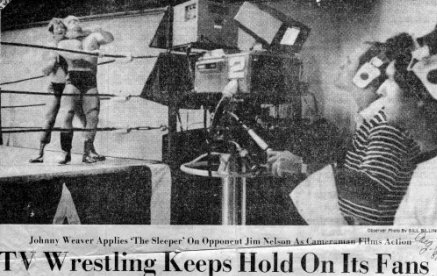
Chappell:
Johnny, I’d like you to give the
audience your thoughts on Jim
Nelson.
Weaver:
We went through a lot….
Chappell:
You were in the middle of that
big match in Greensboro. The
thing with Slaughter, Kernodle
and Steamboat and Youngblood.
You were in the middle of that.
You taught him the sleeper.
Weaver:
One tough kid. He did really
well for me in Canada. Lots of
shows and made lots of money up
there for awhile.
Bourne:
Now, tell us a little bit about
Canada. You actually went up and
booked Canada, right?
Weaver:
Booked Toronto. Crockett had
Toronto and that was one of
Jimmy Crockett’s biggest
mistakes he ever made. We had
our television show on a Buffalo
station. And when we went to run
Toronto, it was down to nothing.
The Sheik had killed it, the one
from Detroit. We got it up in
the $90,000 range and Jimmy gave
the television to New York. I
never did get an answer why. He
gives the station to New York
and then that’s all they wanted
to see was the New York people,
right? But, you know, our guys
got established on there, like
us and Piper and of course, Jim
Nelson and Kernodle and the
cage. Boogie, Piper and Flair
and everybody else was made off
of that Buffalo TV because we
would stay and do a Canadian TV
in Bradford every Monday night
after the show on Sunday. Hayes
and me and Jim and Don, Tony
Parisi, you know, that’s all
they saw. And so, eventually,
once they switched the tape,
they kind of forgot about Piper
and Flair and Valiant and them
and they gave it to New York.
Why? I don’t know.

Weaver:
You know how I knew time was
passing me by? I was always fan
friendly and I would get dressed
and go out and talk to the
people all the time during all
of the matches up until it was
time for me to go on. I did
that for years and years and
years. The girls would all run
up and hug me. And then
finally, they started running up
to me, the girls, and they’d
throw their arms around me,
about a 100 of them, and they’d
whisper in my ear, “Go get
Ricky Steamboat.”
(laughter) And then I knew I
was over the hill.
Bourne:
That’s a great story.
Weaver: Things
pass you by. Another funny
story, I was in Richmond in a
motel. I had five girls in the
room, and Jimmy Garvin walks
by. All the time we used to go
we used to stop and get a fifth
of whiskey before we’d go,
right? And that’s what we had.
This night, I had 5 girls in my
room and my fifth of whiskey and
the door was wide open and Jimmy
Garvin comes in, says hello and
all that and says, “Hey girls, I
got a joint down in my room.”
Next thing I know, me and
whiskey were all that was left.
(laughter). I said well, I
think time has passed as both
by, me and the whiskey. (laughs)
A joint – I thought that was a
bad bar that you went to, you
know. (laughter) It’s kind of
like that email Peggy sent me.
Coke used to be in a bottle we
got out of a drink machine.

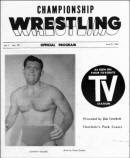
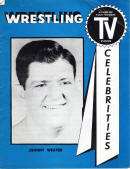
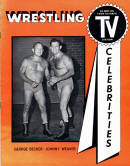

Bourne:
Johnny, you’re still with the
Sheriff’s Department?
Weaver:
Yeah, I got a year and a half to
go. Hope I’ll make it.
Bourne:
Brad Anderson was telling me
that his Dad (Gene Anderson) was
forever indebted to you, that
you got Gene his job with the
Sheriff’s Department.
Weaver:
Yes, I did.
Chappell:
He wasn’t there long before he
died, was he?
Weaver:
Right. He didn’t even get
through BLET and you’ve got to
do that within six months. Al
Mandell went down to the Sheriff
Department and talked the
Sheriff into letting Gene work,
right? So, Al Mandell kept
talking and drove them guys
crazy and talked Gene right out
of the job! (laughs) So, I went
down there and got him the job
and then the sheriff pulled up
his driving record…. (laughs)
But Gene died taking that
class….
Bourne:
Yeah, Brad said he also died of
a broken heart. He didn’t want
to leave wrestling.
Weaver:
No, he sure didn’t.
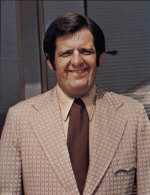 Chappell:
Any thoughts and comments on
Mid-Atlantic towns? We all have
our own memories from watching
you, but any towns that were
good or bad over your years? Chappell:
Any thoughts and comments on
Mid-Atlantic towns? We all have
our own memories from watching
you, but any towns that were
good or bad over your years?
Weaver:
Spartanburg was one of the best
and easiest. I mean, the
building wasn’t that big, but it
was in the basement, it was a
low ceiling and the acoustics
was wonderful. In fact, they got
Terry Kay and Bobby was there
one night and they had Merle
Haggard upstairs. After the
show, we went up the back and we
were behind the curtains up
there with them, you know. They
introduced us to them and Merle
Haggard said, “Oh, you are the
guys making all that noise!”
(laughter) But the acoustics
was great for that.
A
really hard town was Raleigh and
they always said it was because
it was a college town. I don’t
know. I mean, we’ve had big, big
crowds in the Dorton Arena, but
it was really hard and if you
got something going and you went
to Raleigh and you did good in
Raleigh, then you knew you were
you’re going to do good with it
everywhere. Raleigh was a
barometer town.
Chappell:
When we did our interview with
Blackjack, he certainly had a
lot of good things to say about
you. That’s something I wouldn’t
have necessarily figured because
Blackjack was on top then…
Bourne:
Yeah, Blackjack has a soft spot
for you.
Weaver:
I thanked him for it, too,
because he has emailed me and
said, you’ve never gotten the
recognition you should have got.
In fact, I told him to come up
here (western Virginia) when him
and Flair bought Knoxville. They
sent me over there to run it.
God, I was going from Charlotte
to Knoxville to
Toronto…..(laughter) I’d
ride over there because I was
going to fly out to Toronto with
Don (Kernodle) in “Old Silver”
(Don Kernodle's silver
Cadillac.)
We used to go down 85, take Hwy.
11 over through Chesnee and come
out on 26 and go up to
Asheville. As soon as we got on
26, we had a flat. We’re going
to TV. And no spare. I said,
“God, Don, why did you come on
the road with no spare?”
Somehow we got through that.
Well, the next morning I’ve gotta fly to Toronto. I’ve got
to fly from Knoxville to
Nashville to go up to Toronto.
So, I go to the gate and the guy
said such-and-such gate, and I
go out and there might have been
6-7 people and here’s the plane
sitting out there and it’s got a
wheel off the back, off the
ground about that far in the
back. Only got about 12 seats on
the whole durn plane. So, they
board us and we sit down in
there and, man, it’s hot as
hell. Man, here comes this good
looking blonde and I thought,
well, at least we’re going to
have a good looking stewardess.
And by God, she was the damn
pilot. (laughs)
I
had just come back here from
Japan right around the time of
the Wilmington plane crash. I
was also in Florida, had just
came back from Miami. There was
three private airplanes. Anyway,
I went home, went to bed, turned
the radio on the next morning
and the first thing I heard was
rescue squad had fished out the
body of wrestler Bobby Shane out
of Tampa Bay. They had come in
behind us. It was foggy as hell.
Bourne:
Buddy Colt was on that plane.
Weaver:
Yeah. Buddy Colt and Gary Hart.
Buddy was the pilot. He told me
that he swam until he couldn’t
swim no more and he had a messed
up ankle and just said this is
it, and when he did, his feet
went down and his feet touched
land and he walked out or
crawled out or whatever.

Bourne:
Johnny, whenever we’ve posted
our other interviews, many with
some of biggest names in the
business, whether it was Rip
Hawk, or Ric, or Blackjack,
Mid-Atlantic fans would always
write and say, “That was great,
but why haven’t you done Johnny
Weaver?”
Weaver:
Well, that’s nice to know, Dick,
I told Mike and Peggy riding up
here, and I told Jim Nelson on
the e-mail, hell, all my fans
are dead! (laughs)
Everyone:
No! Not true!!
Weaver:
Well, Jim wrote back (laughing)
and said “Oh, no, we still get a
few of them up here!” (laughing)
Bourne:
You wouldn’t believe how happy
we were when you agreed to do
this.
Weaver:
You wouldn’t believe how many
times Peggy asked me to do
it….she asked me so many times,
but I don’t know…….
Chappell:
Any parting words for fans out
there who will be reading this?
Weaver:
Well…..I think if they stay with
wrestling, I don’t know the
answer myself, but I think
someday it’s got to go back to
the way we did it. I see small
groups here and there that do
it, but it’s hard. It’s like
this: With Vince, and I always
hated Vince’s wrestling, but
when Flair went up there, this
was back several years ago,
there was one that knew what he
was doing. And he did what
needed to be done there….like
when I was wrestling, I could
take the lowest guy on the card
and make him look good, and that
is Flair, he makes everyone else
around him look good, and they
need more of that up there, more
guys that give themselves. But
Flair can get the crap kicked
out of him the whole damn match,
and the people are still
roaring, because he’s over. He’s
shown them fans all them years
what he can do and he’s still
doing it. We need more like
that. A lot of guys today don’t
give the other guys nothing,
they just eat ‘em up, and that
ain’t a show. You got to have
them peaks and valleys.
Bourne:
Johnny, thanks so much for
spending time with us this
afternoon, for sharing your
scrapbook, and your memories.
Weaver:
Boys, I have enjoyed it.
|